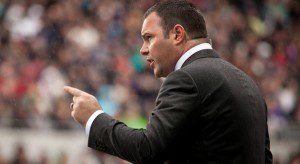 I’ve been pretty tough on Mark Driscoll in the past. I don’t like being that way about any other pastor. But I think he represents something truly dangerous to the gospel. I grew up with a lot of folks very much like him among the Southern Baptist circles in which I was reared – heavy bravado, always right, constantly leading through size and position. It’s a tired script.
I’ve been pretty tough on Mark Driscoll in the past. I don’t like being that way about any other pastor. But I think he represents something truly dangerous to the gospel. I grew up with a lot of folks very much like him among the Southern Baptist circles in which I was reared – heavy bravado, always right, constantly leading through size and position. It’s a tired script.
I know what it means to be a man, and I don’t resonate with any version of that story that is based in fear, shame, or control. I think Driscoll preys on men and women who, in large part, have father/mother/abandonment issues and need an authority figure in their lives. People flock to him because he majors in certitude and isn’t afraid to tell people what to think and do, and isn’t afraid to shame them into doing it. When I look at Driscoll I don’t see a strong confident man/leader, I see a flaccid attempt to be a tough guy; a scared little boy who has taken being the bully all the way to fame and fortune. But his shtick has very little to do with the gospel.
Jonathan Merrit is a pretty good writer and I’ve always enjoyed his stuff. He’s written for USA Today and The Atlantic Monthly as well as this article on Mark Driscoll for RNS. He makes an interesting comparison between Driscoll and Pat Robertson. I can only hope that this is the way things go. I don’t think most evangelicals take Robertson very seriously anymore. I hope the same will soon be said for Driscoll. I know that God has done some great things through his ministry, but I think this is owing to the fact that God uses whatever broken thing he can find, and not because Driscoll’s approach is necessarily faithful. In fact I think that any pastor who has said what he’s said and done what he’s done should have been let go from his church long ago.
For example, he has said:
- Avatar is the “most demonic, satanic film” he’s ever seen.
- Stay-at-home dads are “worse than unbelievers.”
- Women shouldn’t hold leadership positions in the church since they are “more gullible and easier to deceive than men.”
- Fallen pastor Ted Haggard’s wife may be to blame for his infidelity if she didn’t keep herself up.
- Biblical wives should give their husbands frequent blowjobs and perhaps allow their husbands to have anal sex during menstruation.
- If a man masturbates without a woman present, it is “a form of homosexuality.”
I really hope that Driscoll will stop saying outlandish things and come back to the pack a little bit. But I know that’s not how you get your name in the headlines and sell books. Here’s another excerpt from Merrit’s article:
Another growing similarity between the two men is the way they’ve been able to polarize even the core of their own Christian bases. Mainstream Christians desperately want to ignore both figures, but they can’t. They just can’t. There are too many broadcasts and podcasts, book sales and supporters. So instead, many work to distance themselves from either leader whenever their names arise in conversation.
When it comes to Robertson, Christians—even those who voted for him in the ‘88 primaries and watched his television show, “The 700 Club”—are now quick to assert they don’t support him. “I’m not a Pat Robertson kind of Christian,” someone might say.
The same is true for Mark Driscoll. He’s been heavily criticized by Christian voices across the spectrum, and according to reports, several attendees at the Catalyst Conference in Dallaswalked out during his talk. He’s even being marginalized by some Reformed Christians (i.e. Calvinists) who precipitated his rise to prominence. “I’m not a Mark Driscoll kind of Calvinist,” some have remarked to me.
Over the years, both men have been pressured to issue apologies and clarifications. Ironically, when I received word of the comment made at Catalyst, I was in Malawi working with Christian brothers and sisters there who’ve been wracked by environmental devastation. I wondered why an American Christian leader would make insensitive and flippant comments about such a serious topic. One might make the case that in such a situation, it is beneficial for Christians who disagree with their perspectives to distance themselves. After all, when an influential Christian claims to follow Jesus but makes inappropriate remarks, those outside the faith may think they represent all Christians. Unless others speak up.
Unlike Mark Driscoll, I don’t believe that God is going to burn up the world with a literal fire, but I am reminded of another fire mentioned in the Bible. The Apostle James calls the tonguea “small spark” that can set a forest ablaze. When Christians produce leaders with a penchant for bombastic speech—as each generation does—we’re reminded again of the power of words. They can destroy or heal, burn up or breathe life. We get to determine how we use our words just like each generation gets to choose whether to support those who misuse theirs.
And you can take your SUV to the bank on that one.
















